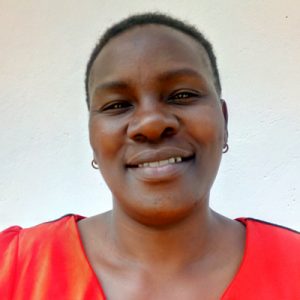
Keeping The Water Promise
There's an incredible community of monthly donors who have come alongside you in supporting clean water in Ikoli Primary School-Mumias East.
This giving community supports ongoing sustainability programs that help Ikoli Primary School-Mumias East maintain access to safe, reliable water. Together, they keep The Water Promise.
We’re confident you'll love joining this world-changing group committed to sustainability!
The following story comes from Field Officer Betty Mwangi, who recently returned to Ikoli Primary School to check up on their rain tank and interview students and staff about the water project's impact in its first year since completion:
"Pupils and teachers are able to clean their hands well after visiting the latrines or anytime they encounter dirt, hence [they are] not spreading the germs unlike before whereby they were not able to clean their hands due to...lacking enough water. [The] presence of water within the school has brought [great] impact [for these] project beneficiaries, in that it came with a package of training them on how to clean their hands and its importance."
"Teachers are more secure on [the] availability of water in the school unlike before [when] they were insecure because they were not sure where the water was brought from by the pupils. [Many] were very afraid [that] some pupils could bring unsafe water in the school, so even eating at school to them was a problem. But, since the project was brought in the school, in the past year they enjoy the products of the water project without any worries."

Head Teacher Mr. Chitechi with student Cheinster Indeche shaking Field Officer Betty Mwangi's hand in front of the rain tank
"Pupils are not suffering from the waterborne diseases and end up missing school unlike before [when] they could miss school due to illness that was caused by unsafe water. Taking clean and safe water that is always treated has brought much change to the lives of these beneficiaries."
"The [student health] club has improved their lives in such a way that they captured what they were taught during [their] training on income-generating activities and they decided to keep poultry for themselves at their homes since in the school there is no security. They have about 10 chickens [from] which they normally gather the eggs and sell to their teachers."
The money they get from their sales they collect together, and through their sanitation teacher and the head teacher, they buy liquid soap which is used to clean their latrines. On the same note, they have been able to continue training others on [the 10] handwashing steps on a weekly basis which has really improved so much even the lives of the [youngest students] who always clean their hands after visiting their latrines. All these changes are caused by the presence of the water project in the school.
"To be precise, this group of people through the head teacher has really tried to maintain their water usage. They were offered a 5,000-liter [rain tank] by [the government] within this year and the head teacher decided that the water from that tank - since it's not treated - will be used for cleaning and washing, whereas the TWP tank will be used for drinking and cooking because it's safe and clean. Throughout the year [even] now [as] they are about to go for holidays, they still have enough water."
"Having water in the school has really changed their environments including classrooms and latrines. Pupils don't get...dirty like before because they clean their classes and latrines every day. Generally, the water project has brought much improvement in the school including shaping the school, it has also made FOT Foundation to be recognized whenever any of the staff members pass by the school, pupils always shout The Water Project."

Cheers to clean water!
Head Teacher Mr. Chitechi has been a champion of the rain tank and other WaSH projects at Ikoli Primary School. Interviewed by Field Officer Betty, Mr. Chitechi reflected on the many improvements these projects have made on his school in the last year. (To hear Mr. Chitechi and student Cheinster Indeche say thank you, check out their video on the Photos tab of this project!)
"Time management has been controlled since the past year. This is because pupils used [to]...run up and down in search of water which they used to fetch some distance away from the school...even sometimes carrying from their homes hence ending up not completing their lessons on time and even others being skipped. But now, lessons run smoothly without any interference and so [this is] a big change in this institution.
[We have] improved hygiene standards of both the staff and pupils, whereby handwashing after visiting [the] latrines or even before eating anything has been observed. Also, cleaning of utensils, as well as cooking and drinking of the clean water, is a big change.
[There is now a] good relationship between pupils and teachers. This is because before, teachers on duty used to have bad [a] relationship with pupils when they sent them out of class to go and fetch water or reminding them to carry water while coming to school. It's something that used to create enmity between teachers and pupils, but now the water is within the school building, therefore, everybody is able to access it freely. It has made pupils become more friendly to their teachers and even improved on respect."

Mr. Chitechi enjoys a drink of fresh water with a school staff member
Cheinster Indeche, a 14-year-old student, was glad to share how his experience as a student at Ikoli Primary School has already been shaped by the water projects in the last 12 months.
"Personally, I used to see it [as] hectic and tiresome carrying water from home or going to fetch [it] from a nearby spring, instead of concentrating in class. Our cook also used to have it rough going to fetch water or even sometimes sending pupils to go and bring water, which took more time and delayed food for both pupils who take their lunch at school and teachers."
"But, since the water was brought within the school, everything changed. It is easy to fetch water within the school at the water tank, the cook also saves much time and she is able to prepare for lunch on time."
"I usually feel happy and safe while drinking the water from the tank because it is clean and safe because it's always treated.Before we were forced to carry along drinking water from home and if you forgot to carry [it] then you could suffer feeling thirsty and [there was] nobody to offer water."
"My school uniform is always clean as well...because before, cleaning classes was a problem due to inadequate water in the school but now it's easy because of [the] availability of water in the school."
"Washing hands was also difficult after visiting [the] latrines because there was no water but now, cleaning is easier and also we were trained on how to clean our hands with water and soap."

Navigating through intense dry spells, performing preventative maintenance, conducting quality repairs when needed and continuing to assist community leaders to manage water points are all normal parts of keeping projects sustainable. The Water Promise community supports ongoing sustainability programs that help Ikoli Primary School-Mumias East maintain access to safe, reliable water.
We’d love for you to join this world-changing group committed to sustainability.
The most impactful way to continue your support of Ikoli Primary School-Mumias East – and hundreds of other places just like this – is by joining our community of monthly givers.
Your monthly giving will help provide clean water, every month... keeping The Water Promise.

 Rainwater Catchment
Rainwater Catchment
 Rehabilitation Project
Rehabilitation Project







































